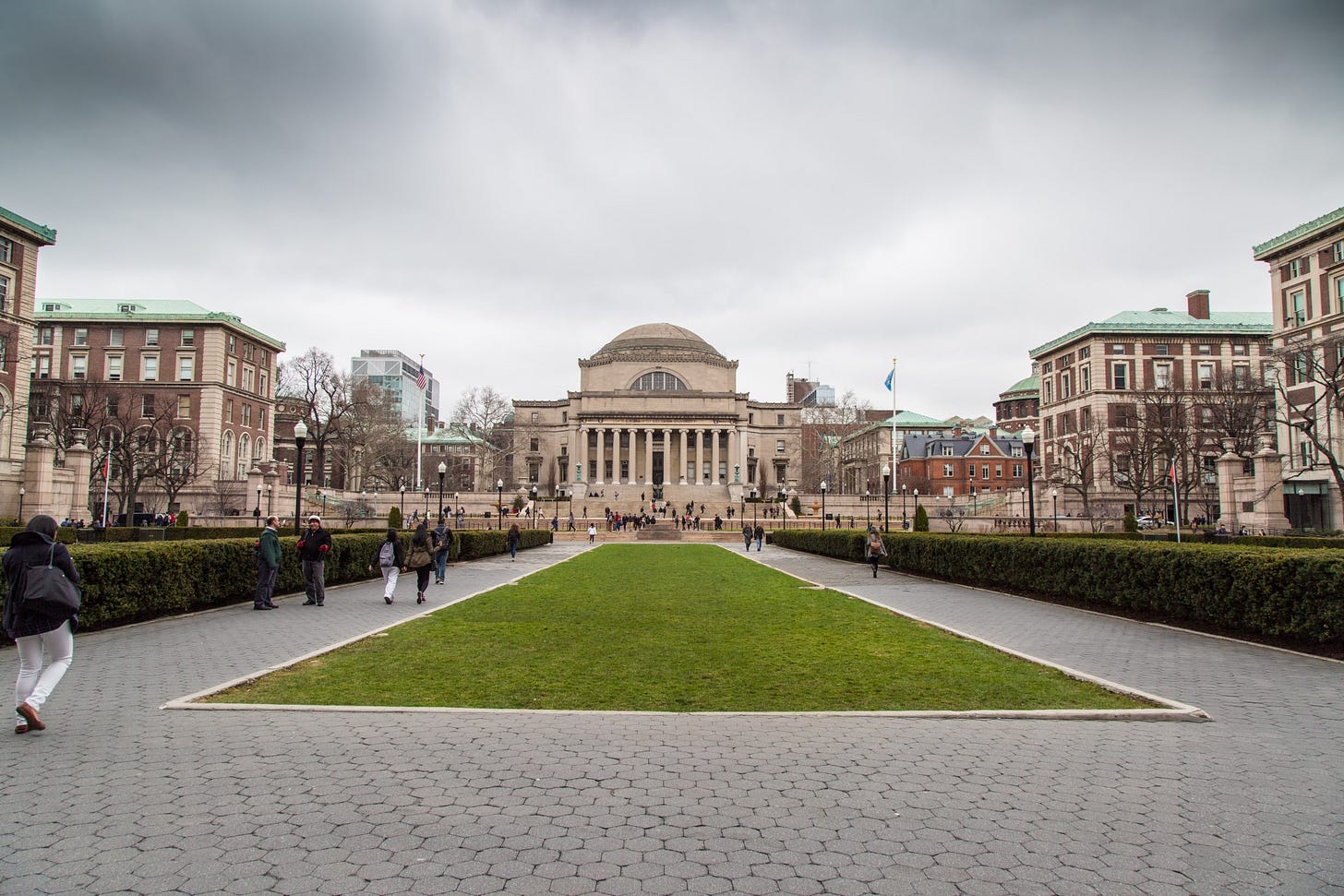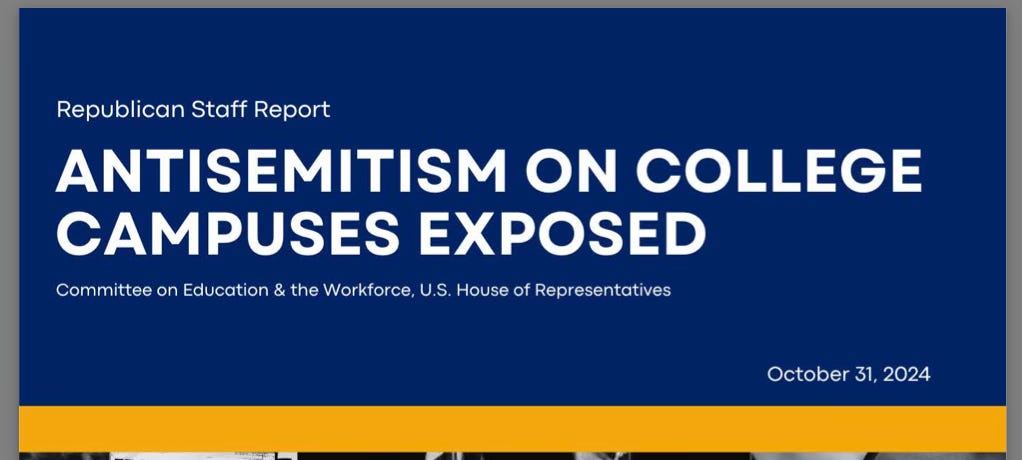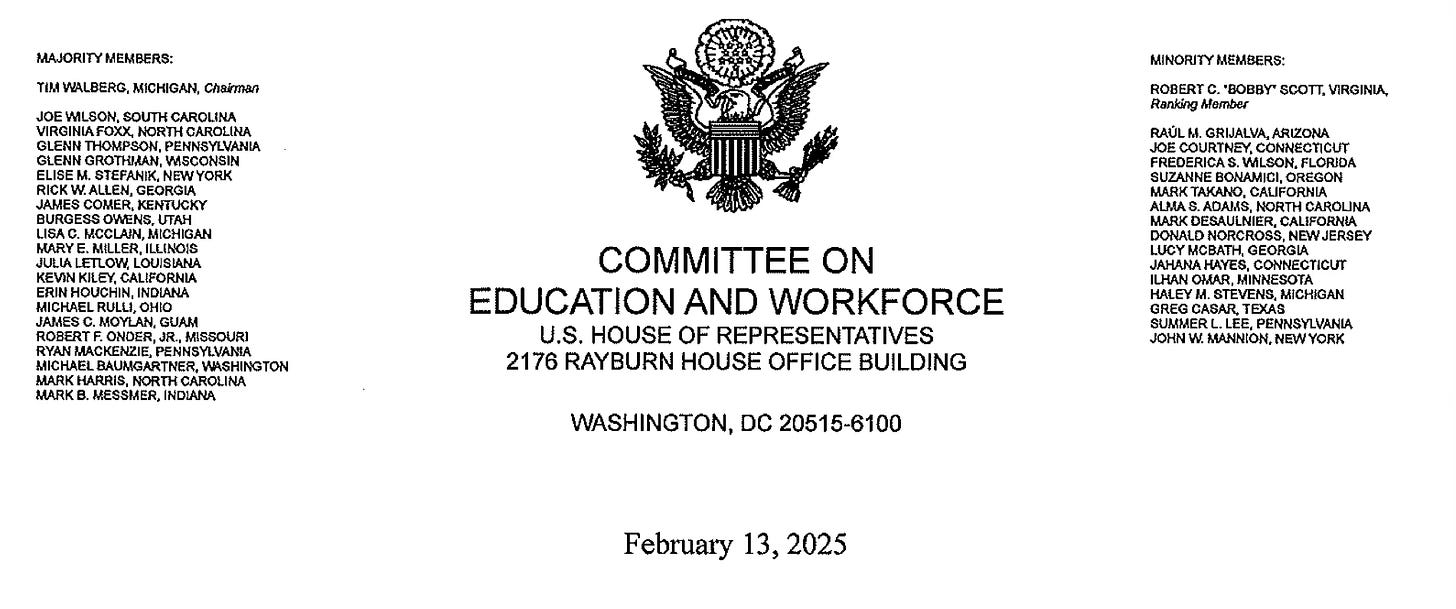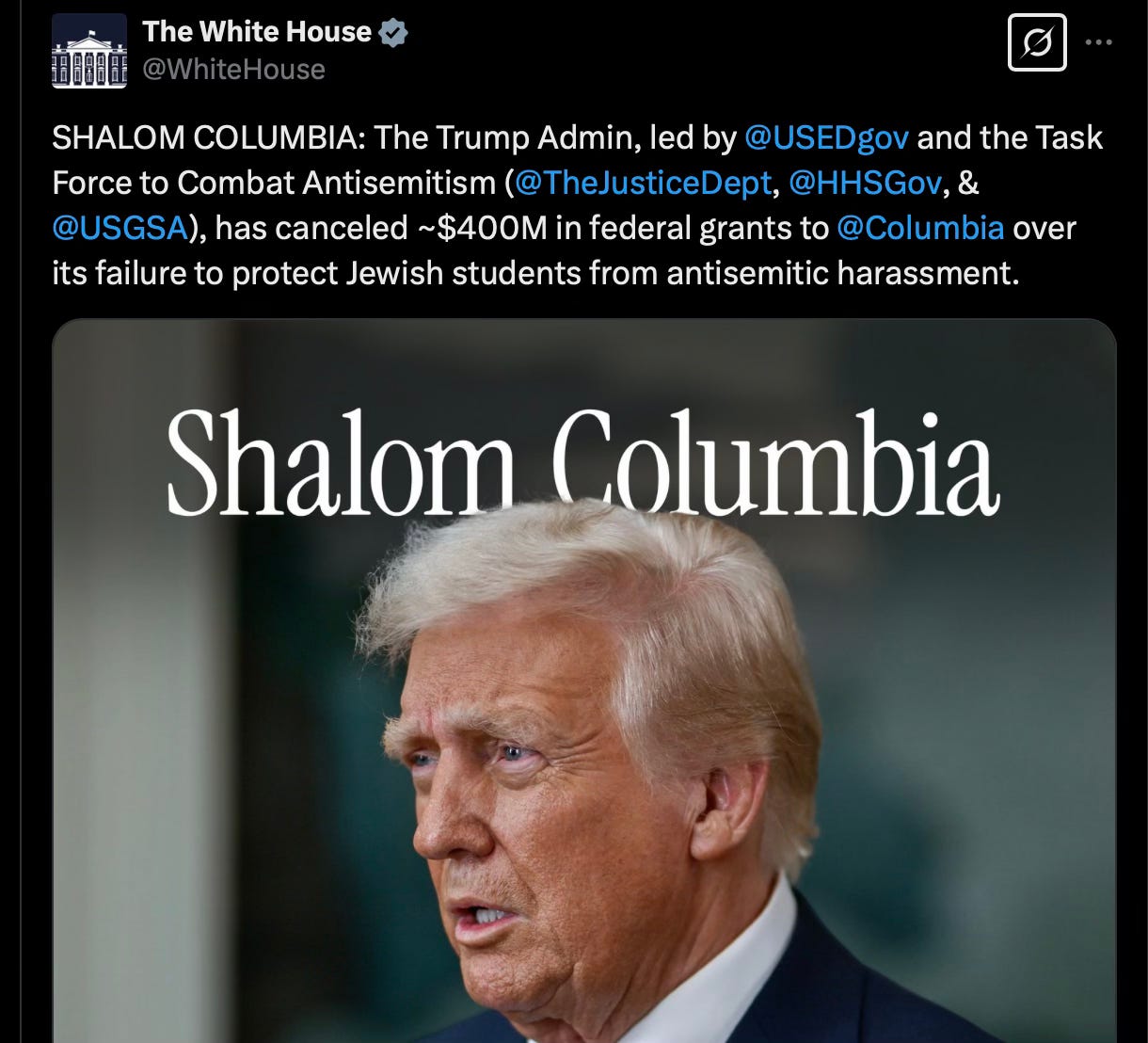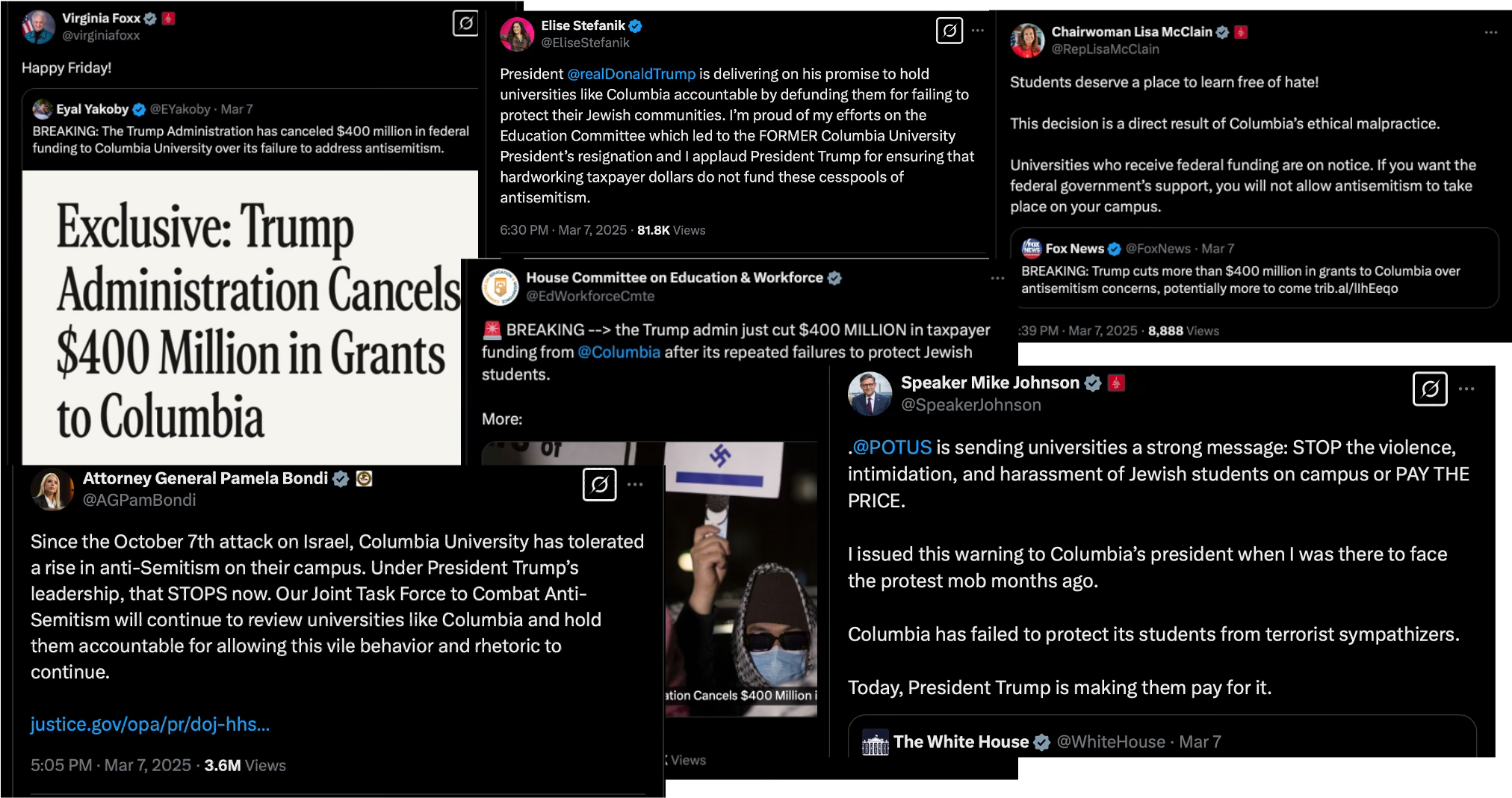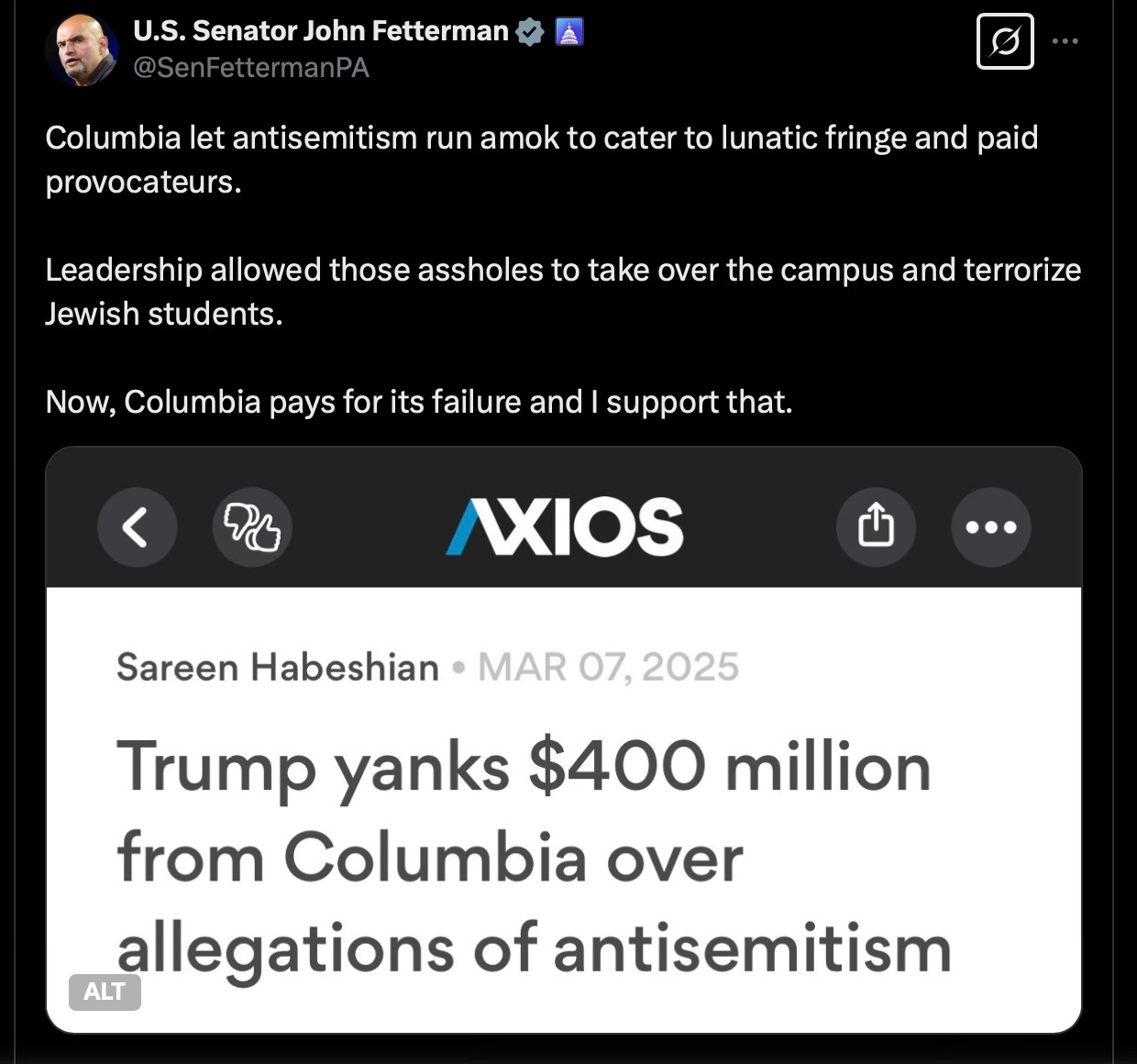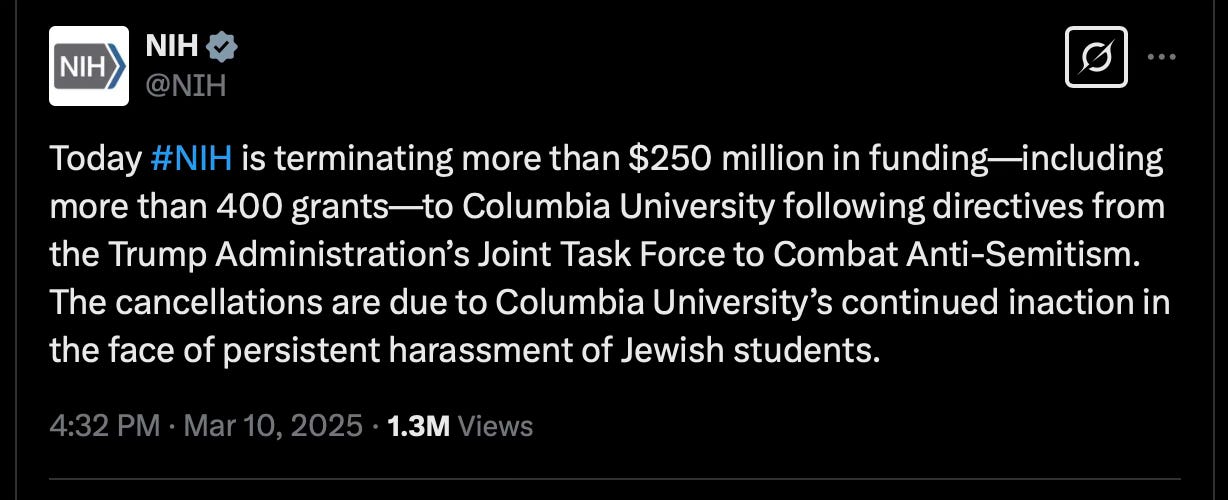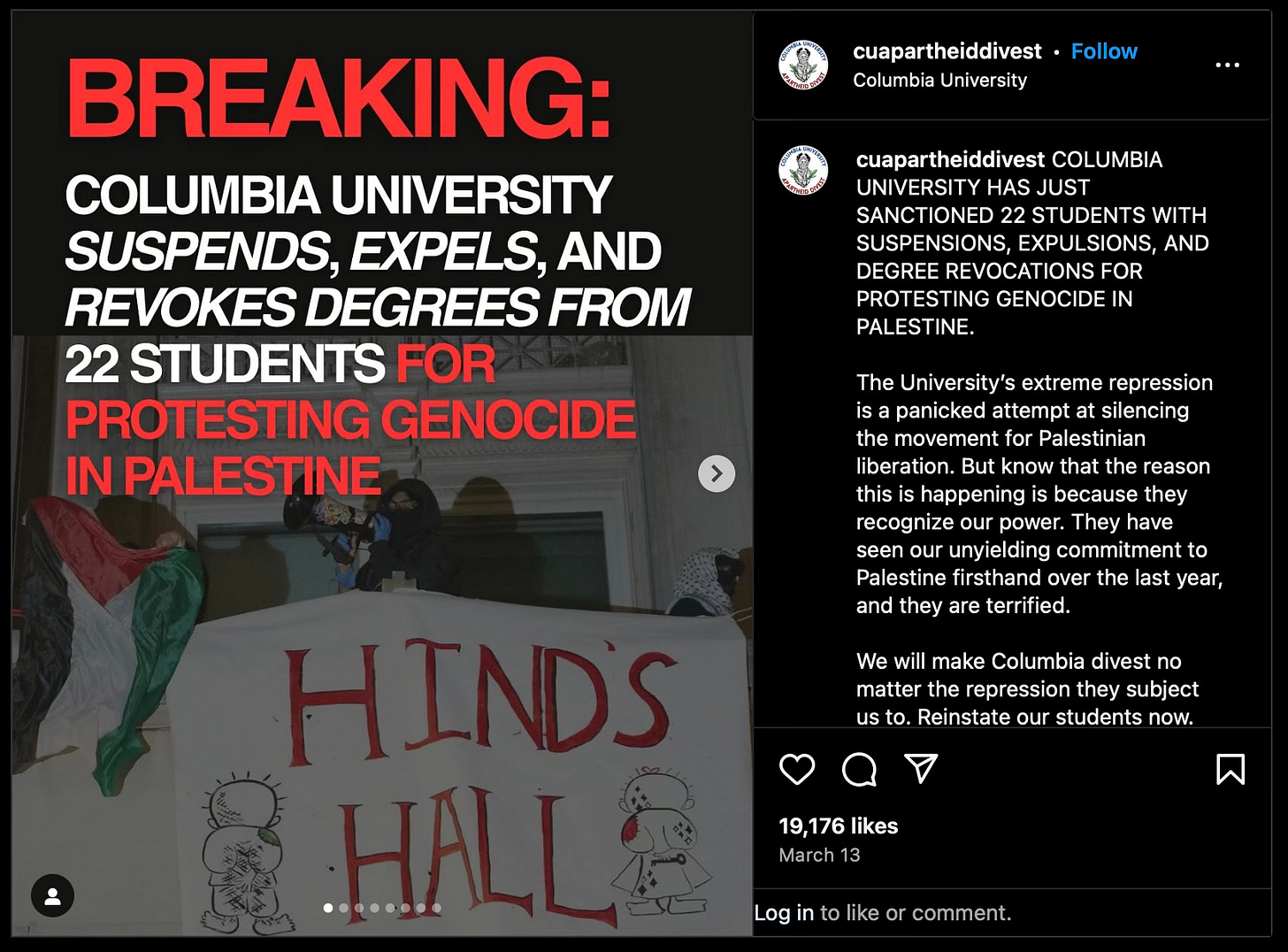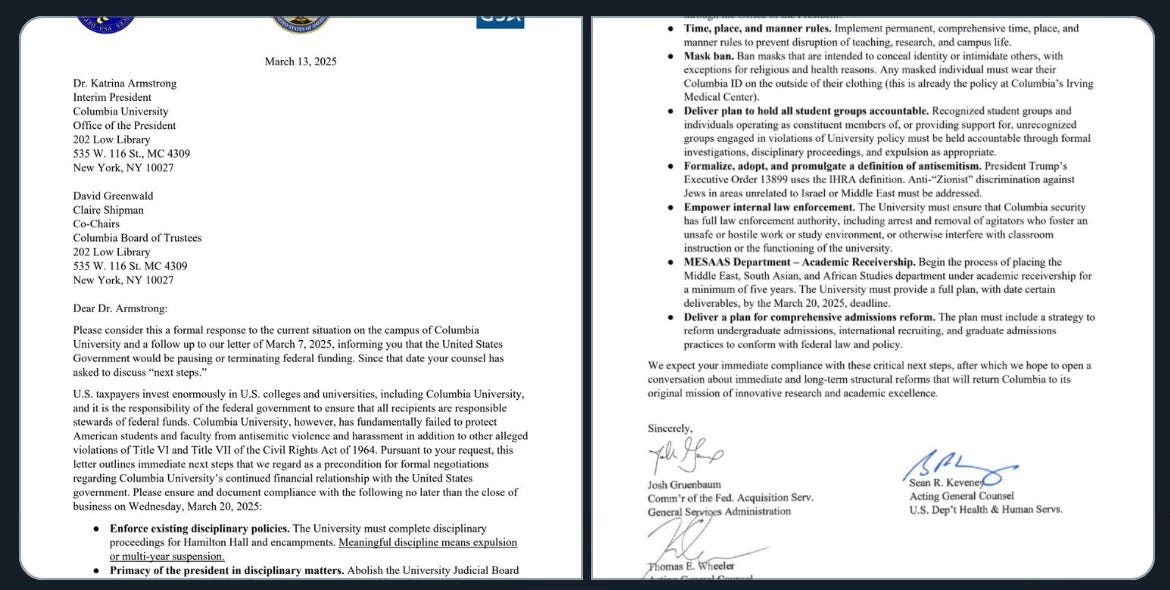Before I start this post, I want to state upfront that this will not be a post about Israel/Palestine or antisemitism, per se. I make no statements as to whether actions occurring at Columbia were antisemitic or not. This post will examine the government timeline of actions taken, the demands requested by the administration, Columbia’s reaction, and what this means for higher education in general.
By any measure, Columbia University stands as one of the premier universities within the United States. Whether because of its Ivy League status, or its veneer of “exclusivity”, or simply the fact that it predates the founding of our country, Columbia attracts the best and brightest from around the world. Latest estimates have the international population at around 14,000 students and this doesn’t even count the many professors who hail from around the globe. In any situation that brings together so many points of view into one fairly restricted area, conflict may arise. Most of the time, the result of differing viewpoints simply results in healthy debate or peaceful protest. These play out over and over and over again throughout the country, on campuses large and small, public and private. It is healthy. It makes us stronger as a nation. It promotes development of ideas and ideals. It strengthens critical thinking skills. Without healthy discussion and debate, we cannot grow as individuals or a country. But there are times when peaceful disagreement turns ugly. Protests may turn into riots. Spoken words can devolve into hate speech.
Personally, I was not on Columbia’s campus when the Israel/Palestine conflict heated up, leading to multiple incidents on campus. I only know what I see and read in the news, so I make no judgment about who is “right” or “wrong”. I have colleagues at Columbia and I have given talks at Columbia. So my personal experience of Columbia is only in the academic sense. But I feel sorrow on many levels for what has occurred and for what actions have been taken by and towards the university. From that very basic academic sense, from the perspective of being a professor at a large university, from the viewpoint of someone granted a Ph.D. at a university similar in many ways to Columbia, I worry how these actions play out towards ALL higher education.
Many news articles have been published regarding the incidents at Columbia and a simple internet search can lead to a wealth of information and commentary. In general, pro-Palestinian protests seem to have been louder and more prevalent on Columbia’s campus. There were tent encampments, disruption of classes, and even a take-over of Hamilton Hall. What has been most concerning, especially to the government, is the descent into antisemitic rhetoric and harassment of Jewish students, particularly since fall of 2024.
To address antisemitism on campuses, the House Committee on Education and Workforce released a 325-page report which highlighted actions at Columbia.
Congress released a summary report on December 18, 2024, in which multiple universities were specifically called out, including Columbia, Harvard, UCLA, Northwestern, and Penn. The report gives recommendations for potential actions against universities who fail to curb antisemitism.
After Trump took office, he released Executive Order 13899 to combat antisemitism on January 29, 2025. This was followed by a fact sheet on January 30, 2025. Among the fact sheet was this statement:
To all the resident aliens who joined in the pro-jihadist protests, we put you on notice: come 2025, we will find you, and we will deport you. I will also quickly cancel the student visas of all Hamas sympathizers on college campuses, which have been infested with radicalism like never before.
On February 3, 2025, the Department of Justice announced the formation of a Task Force to combat anti-semitism. Pursuant to this, the Task Force announced on February 28, 2025 the first 10 targeted universities: Columbia University; George Washington University; Harvard University; Johns Hopkins University; New York University; Northwestern University; the University of California, Los Angeles; the University of California, Berkeley; the University of Minnesota; and the University of Southern California.
In a February 13, 2025 letter to the Interim President of Columbia, and the trustees of Columbia, the Committee on Education and Workforce demanded that Columbia address concerns of antisemitism.
This letter spells out various incidents of concern on Columbia’s campus and actions (or inactions) taken by the university to address these incidents. It demands a full accounting by noon on February 27, 2025.
[It should be noted that Columbia is a private university, but it does receive federal monies in several forms, especially in research grants.]
At Columbia, protests continued, including a sit-in at Milbank Hall which created $30,000 worth of damages to university property. The President of Barnard College, the women’s college affiliated with Columbia, penned an op-ed with the title “When Student Protest Goes Too Far”, agreeing that expulsion is warranted in some situations, especially those involving property damage or injuries.
At the beginning of March 2025, the Anti-Defamation League (ADL) released its report card on antisemitism on 135 American campuses. Grades were assigned based on 30 criteria, more information can be found on their website. Columbia received a grade of “D”, due to the unrest on campus.
On March 3, 2025, a joint press release by the Education Department, HHS, and GSA announced a comprehensive review of federal funding to Columbia.
On March 7, 2025, the Department of Justice joined with the ED, HHS, and GSA to announce the cancellation of $400 million in grants and contracts.
The White House further publicized this action on X, and was echoed by multiple government officials:
Even some Democrats celebrated (John Fetterman, PA).
Unfortunately, these grant cuts target researchers at Columbia who had nothing to do with the antisemitism on campus. Of the $400 million, at least $250 million was for medical research, primarily funded by NIH. Some of this funding is for diabetes studies that had been continuous for a quarter of a century, which now faces an abrupt end to data collection. The loss of this continuity to the medical community cannot be understated.
The Interim President of Columbia issued a response email to the community and an address to the University Senate, which was followed by a statement from the Vice President for Research and the Provost. In this statement, it is evident that there was a lack of clarity on which grants had been canceled. It reads “For now, unless you received a stop-work order or termination notice, researchers should continue to perform work on awarded federal projects.” Note the term “awarded” - these were grants issued by the federal government by the proper methods and researchers are dependent on these funds to pay for experiments and staffing. Without federal grants, a large portion of critical research will stop dead in its tracks and many people will lose jobs. Federal grants often pay for the tuition and wages for graduate students, so this will impact future research for years to come and stunt the influx of new blood and new ideas into the greater research community.
On March 13, 2025, Columbia University officials announced further suspensions, expulsions, and revoking of degrees for some of the students involved in the Hamilton Hall occupation. Students were upset, leading to statements like this Instagram post:
Others, mostly faculty members, applauded the university cracking down on antisemitism, though some believe it did not go far enough. Revoking degrees seems like an excessive punishment, not related to the fact that degrees are earned by merit rather than behavior.
The federal government sent Columbia University a letter on March 13, 2025, with a list of demands in order to begin to reinstate funding.
Two things of note to begin:
the deadline given to acquiesce to these demand is only one week, expiring at close of business on Wednesday, March 20, 2025 (emphasis mine) — March 20 is a Thursday…
there is no guarantee that funding will be reinstated even if all demands are met: “this letter outlines immediate next steps that we regard as a precondition for formal negotiations regarding Columbia University's continued financial relationship with the United States government” (emphasis mine)
Let’s look at the actual demands, point by point:
Enforce existing disciplinary policies. The University must complete disciplinary proceedings for Hamilton Hall and encampments. Meaningful discipline means expulsion or multi-year suspension.
As noted above, the university complied with this demand.
The faculty senate at Columbia discussed disciplinary action and modification of campus rules in depth at their meeting on September 10, 2024.
There were 46 people arrested by the NYPD during the Hamilton Hall incident. The district attorney completely dismissed charges for 31 of these individuals. Presumably, the students not cleared are the main ones being examined for discipline by the university.
Primacy of the president in disciplinary matters. Abolish the University Judicial Board (UJB) and centralize all disciplinary processes under the Office of the President. And empower the Office of the President to suspend or expel students with an appeal process through the Office of the President.
Although the UJB appeared to not move quickly, the investigation of incidents did move through the necessary processes.
UJB hearings began on January 6 and continued throughout the month, in accordance with the rules and guidelines set forth by the university.
The UJB is similar to disciplinary boards at many universities, with a panel of five faculty, staff, and student members, vetted for any potential conflicts. None of the three categories have more than two people, thus avoiding a majority to “tip the scales”. Abolishing this pathway would undermine fair hearings from impartial adjudicators.
The UJB is already a centralized disciplinary structure.
The UJB abides by strict rules and guidelines imposed by the university. There is a set appeals process, too.
Having the UJB be answerable to (and overseen by) the President makes some sense, but removing the UJB entirely does not make sense.
Time, place, and manner rules. Implement permanent, comprehensive time, place, and manner rules to prevent disruption of teaching, research, and campus life.
These are already in place. See Guidelines under Prohibited Conduct.
This, too, was discussed during the faculty senate meeting in Sept. 2024.
Mask ban. Ban masks that are intended to conceal identity or intimidate others, with exceptions for religious and health reasons. Any masked individual must wear their Columbia ID on the outside of their clothing (this is already the policy at Columbia's Irving Medical Center).
In addition to religion and health, “masks” can be a form of solidarity during protests and are likely considered a form of free speech by many.
If health masks (i.e. COVID N95) are permitted, what is to prevent protesters from wearing these and claiming “health”?
Formalize, adopt, and promulgate a definition of antisemitism. President Trump's Executive Order 13899 uses the IHRA definition. Anti-"Zionist" discrimination against Jews in areas unrelated to Israel or Middle East must be addressed.
The IHRA (International Holocaust Remembrance Alliance) definition:
Columbia’s definition, from its report on antisemitism on campus, presented to the faculty at the senate meeting on September 10, 2024.
Empower internal law enforcement. The University must ensure that Columbia security has full law enforcement authority, including arrest and removal of agitators who foster an unsafe or hostile work or study environment, or otherwise interfere with classroom instruction or the functioning of the university.
Most universities have some sort of campus police, although it varies widely on their authority to “arrest” agitators.
MESAAS Department - Academic Receivership. Begin the process of placing the Middle East, South Asian, and African Studies department under academic receivership for a minimum of five years. The University must provide a full plan, with date certain deliverables, by the March 20, 2025, deadline
Receivership is a BIG DEAL. This is when a department is put under the control of an outsider. Such as an English professor being appointed chair of the Biology department.
Receivership is very, very rare, and typically only for a short term. Limited information is available, often due to this being a very quiet internal matter.
The causes of receivership are few, but most often due to infighting between faculty members that rises above simple disagreement and becomes public.
Another cause for receivership is the department becoming misaligned with the priorities or mission of the university.
Deliver a plan for comprehensive admissions reform. The plan must include a strategy to reform undergraduate admissions, international recruiting, and graduate admissions practices to conform with federal law and policy.
Why is admissions reform necessary? Is there evidence that they are rejecting/accepting certain types of students more than others? This is a difficult university to get accepted into, with students being the cream of the crop, just like the other Ivy League schools.
Universities are already under obligation to “conform with federal law”. But policy is tricky - does this mean modifying methodology to match the current administration policy preferences? What if that becomes antithetical to the core values of the university in question?
So, how did Columbia address the letter? As discussed above, some of these items had already been addressed by Columbia. The statement issued by the Columbia Interim President addresses these issues and capitulates to almost everything demanded. Highlights include:
The UJB now resides under the Provost, who answers to the University President. The UJB will now only have faculty and administrator members. Excluding student representation fails to a balanced viewpoint.
Protestors, regardless of peacefulness, are subject to being asked for identification. This places undue pressure and fear onto individuals who are exercising their 1st amendment rights.
The university has hired 36 law enforcement personnel, who will have the proper credentials to arrest.
A new senior provost will be hired to oversee the departments of concern.
Columbia University already possessed a robust set of rules governing student conduct during protests. The rules of university conduct were updated in August 2024, and are mandated by university policy to be re-evaluated and updated as necessary, not longer than every four years. Whether they have been enforced adequately remains a question to be answered, but it should be promulgated from the administration, not the federal government.
Among these rules are a set of prohibited actions by protesters, including defining them as “simple” or “serious”. These categories dictate the range of sanctions available for violations. Many of the protester actions do fall under the “serious” category and are thus subject to harsher sanctions, such as suspension.
To be clear, antisemitism should never be tolerated, nor should any other type of hate speech or discrimination or harassment. But, the federal government stepping in to abridge academic freedom by requiring a department be put into receivership is unprecedented and worrisome for all other universities who might disagree with government policy or have instances of protests that conflict with the government’s preferred opinion. Five years is a very long period for an academic department to be under outside control. In this case, there is neither a reasoning for the receivership, nor a methodology for the ending of the receivership.
By Columbia’s capitulation to federal demands, it sets a precedent that the government might come after other universities with policies at odds with the current administration. Indeed, it already has. The University of Pennsylvania may have funds withdrawn as soon as this coming week because of transgender swimmer Lia Thomas (who graduated 3 years ago). The federal government has targeted 60 universities for antisemitism and 45 universities for racial preferences.
Even more concerning is the government revoking federal funding without the proper procedure. The actions demanded by the government were justified using Title VI. My next post will be a discussion of Title VI, how it relates to the ongoing situation with universities under fire by the federal government, and the proper sequence of actions. I may also delve into some thoughts on where constitutional law may have a say in what has occurred thus far.
The fog is getting darker, but still we press onward.
Please consider sharing and subscribing.




